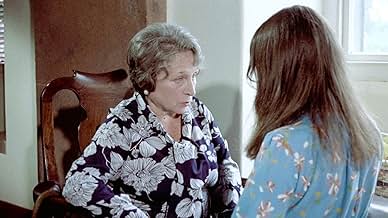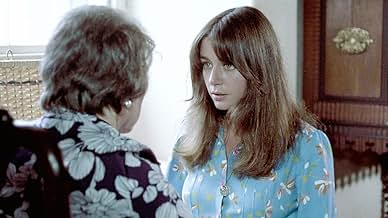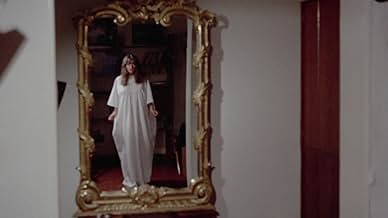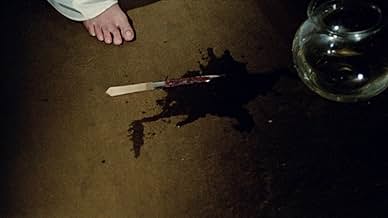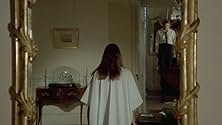A nightclub singer is haunted by the ghost of her late father. The dead man summons her through a mirror, forcing her to commit a series of violent crimes.A nightclub singer is haunted by the ghost of her late father. The dead man summons her through a mirror, forcing her to commit a series of violent crimes.A nightclub singer is haunted by the ghost of her late father. The dead man summons her through a mirror, forcing her to commit a series of violent crimes.
- Awards
- 1 win total
Robert Woods
- Bill
- (as Robert Wood)
Françoise Brion
- Carla
- (as Francoise Brion)
Alice Arno
- Tina
- (as Alice Arnó)
María Bassó
- Elvira
- (as Maria Bassó)
Ada Tauler
- Stefania
- (as Adela Tauler)
Chantal Broquet
- Angela
- (uncredited)
Carmen Carbonell
- Tante
- (uncredited)
Jesús Franco
- Roger
- (uncredited)
Nicole Guettard
- Gloria
- (uncredited)
- Director
- Writers
- All cast & crew
- Production, box office & more at IMDbPro
Featured reviews
Here is another of those elusive Franco films that in its proper context is neither horror, nor porn or sexploitation, in spite of the hardcore inserts, but wandering around urges.
Now I appreciate Franco in the way you do with a friend or co-worker you have known forever. I appreciate him, in part, because of how familiar his flaws and habits. So I won't mollycoddle him or pretend in his face: he was often sloppy, charmless as a thinker and embarrassing in a number of ways. Whereas some fans read profundity in this film, for me all the stuff about mirrors, madness and theater as staged inner life are as sophomoric as it gets, for instance that whispers of a damaged mind will issue from a mirror.
Let me say here that it's not the elements themselves, which others like Rivette, Resnais and Ruiz have used to similar effect, but the narrative distance they are placed away from the viewer, distance that leads up to them and away from.
But I accept it as part of the experience of shared intuition that is possible with a good friend; Franco is worth knowing because, going past conscious narrative impositions, I can relax in a fluid fabric of images which he seems to spontaneously stir up from life as he walks through it. The more of his films I watch, the more I relax because I have shared in previous travels.
It's all in the last scene here.
Leading up to it we have obviously layered madness about a woman reliving guilt from her past, inserts of incestual cunnilingus and hardcore sex (in the Italian version I saw), and relaxed wandering around bars and later exotic Madeira. As a whole the film evokes Franco's films with Soledad, She Killed in Ecstasy and Eugenie. It is not as 'pure' as Female Vampire, nor on the other hand as testing.
The idea, tremendously simple, is that a woman wanted to get married, but her beloved sister killed herself out of desperation and perhaps spurned love, and she carries this burden in unfulfilled affairs with men.
The Spanish version without the inserts may flesh out the story a bit more, but story is not the main point, it's swimming across to where images acquire life of their own.
In the last scene we have all this, the wandering, madness, and repressed emotion, coalesce together in a beautiful way as a bridal veil fluttering in the wind.
Now I appreciate Franco in the way you do with a friend or co-worker you have known forever. I appreciate him, in part, because of how familiar his flaws and habits. So I won't mollycoddle him or pretend in his face: he was often sloppy, charmless as a thinker and embarrassing in a number of ways. Whereas some fans read profundity in this film, for me all the stuff about mirrors, madness and theater as staged inner life are as sophomoric as it gets, for instance that whispers of a damaged mind will issue from a mirror.
Let me say here that it's not the elements themselves, which others like Rivette, Resnais and Ruiz have used to similar effect, but the narrative distance they are placed away from the viewer, distance that leads up to them and away from.
But I accept it as part of the experience of shared intuition that is possible with a good friend; Franco is worth knowing because, going past conscious narrative impositions, I can relax in a fluid fabric of images which he seems to spontaneously stir up from life as he walks through it. The more of his films I watch, the more I relax because I have shared in previous travels.
It's all in the last scene here.
Leading up to it we have obviously layered madness about a woman reliving guilt from her past, inserts of incestual cunnilingus and hardcore sex (in the Italian version I saw), and relaxed wandering around bars and later exotic Madeira. As a whole the film evokes Franco's films with Soledad, She Killed in Ecstasy and Eugenie. It is not as 'pure' as Female Vampire, nor on the other hand as testing.
The idea, tremendously simple, is that a woman wanted to get married, but her beloved sister killed herself out of desperation and perhaps spurned love, and she carries this burden in unfulfilled affairs with men.
The Spanish version without the inserts may flesh out the story a bit more, but story is not the main point, it's swimming across to where images acquire life of their own.
In the last scene we have all this, the wandering, madness, and repressed emotion, coalesce together in a beautiful way as a bridal veil fluttering in the wind.
Obscene Mirror (1973)
*** (out of 4)
This is a pretty well, if highly praised, film from the Spanish director, which is (apparently) available in three different versions. The version getting all the love and praise is the Spanish version while the French and Italian versions are re-edited with hardcore scenes and an alternate cast added to the mix. The version I watched was the Italian one, which is hard to review due to the hardcore scenes, which were added. The basic plot, I believe, is the same from each version and centers on a woman (Emma Cohen) who suffers a breakdown after the suicide of her sister (played by Lina Romay in this version). Soon after the suicide the sister begins to see her dead sister inside a mirror, which causes her to go out, bring men home and kill them. Again, it's really hard to judge this film due to the added scenes and the fact that the Spanish version is apparently totally different but there was enough here to I loved to recommend people seeing this but at the same time you should certainly try and get the original version (which I will be looking for). The film reminded me a lot of Franco's Venus in Furs, which is among the director's best films. There's a deeply haunting, sad and tragic nature and atmosphere, which runs throughout this film and it wasn't hard to get caught up into the mental state of the main character. Franco's direction is very sharp throughout but most of the credit has to go towards Cohen who is simply terrific in the film. She doesn't have to resort to nudity or cheap thrills to get her performance across. I guess the best way to explain it is that she comes across like a spirit and just floats from one scene to the next, slowing breaking down in front of our eyes. Sadly the disc I watched also didn't feature any subtitles so I couldn't follow any of the dialogue, which there was plenty of and I'm sure if I could follow the story more I would have loved it even more. The hardcore scenes, which again, were added, are pretty ugly and add absolutely nothing to the movie. These scenes really killed everything that was going on so I found myself hitting the FF button through them. I'm hoping to track down the director's cut soon since most fans think this Italian version is a complete mess. If it is a mess and I enjoyed it this much then I can't wait to see what the Spanish one offers.
*** (out of 4)
This is a pretty well, if highly praised, film from the Spanish director, which is (apparently) available in three different versions. The version getting all the love and praise is the Spanish version while the French and Italian versions are re-edited with hardcore scenes and an alternate cast added to the mix. The version I watched was the Italian one, which is hard to review due to the hardcore scenes, which were added. The basic plot, I believe, is the same from each version and centers on a woman (Emma Cohen) who suffers a breakdown after the suicide of her sister (played by Lina Romay in this version). Soon after the suicide the sister begins to see her dead sister inside a mirror, which causes her to go out, bring men home and kill them. Again, it's really hard to judge this film due to the added scenes and the fact that the Spanish version is apparently totally different but there was enough here to I loved to recommend people seeing this but at the same time you should certainly try and get the original version (which I will be looking for). The film reminded me a lot of Franco's Venus in Furs, which is among the director's best films. There's a deeply haunting, sad and tragic nature and atmosphere, which runs throughout this film and it wasn't hard to get caught up into the mental state of the main character. Franco's direction is very sharp throughout but most of the credit has to go towards Cohen who is simply terrific in the film. She doesn't have to resort to nudity or cheap thrills to get her performance across. I guess the best way to explain it is that she comes across like a spirit and just floats from one scene to the next, slowing breaking down in front of our eyes. Sadly the disc I watched also didn't feature any subtitles so I couldn't follow any of the dialogue, which there was plenty of and I'm sure if I could follow the story more I would have loved it even more. The hardcore scenes, which again, were added, are pretty ugly and add absolutely nothing to the movie. These scenes really killed everything that was going on so I found myself hitting the FF button through them. I'm hoping to track down the director's cut soon since most fans think this Italian version is a complete mess. If it is a mess and I enjoyed it this much then I can't wait to see what the Spanish one offers.
For years and years, I fanatically defended the work of writer/director Jess Franco, but with every film of his that I watch, I wonder why I ever bothered. Maybe I should accept the fact Franco only made a handful of influential and genuine exploitation classics ("The Awful Dr. Orloff", "The Diabolical Dr. Z", "Faceless"), whereas the vast majority of his excessively large repertoire is just utter garbage.
And yet, for a good 15-20 minutes, it really seemed as if "The Obscene Mirror" would become another Franco-winner! The first quarter is definitely promising, with the introduction of a widower (Franco-regular Howard Vernon) and his two beautiful daughters Annette and Marie. Annette is head over heels in love with archeology student Arthur, but Marie is so jealous of her sister's happiness that she commits suicide by ramming a sword in her stomach one day before the wedding. Following the tragedy, Annette is so confused that she abruptly calls off her wedding and starts a new life as piano player in a raunchy bar. From this moment on, Annette hears and sees her sister appearing in an antique mirror, and Marie's vengeful spirit commands her to brutally slaughter every man she's sexually attracted to.
At least, this is the plot of the version I watched, because - apparently - there also exists a version in which it's Annette's father who commits suicide and commands her to kill. Oh well, just another typical flick in Jess Franco's bizarre universe.
With the exception of the compelling first 15 minutes, "The Obscene Mirror" is a dreadfully boring and frustrating film. Franco reverts to his bad habit of inserting overlong (and very un-sexy) hardcore footage, which absolutely doesn't have any added value. During countless of times during the film, you'll find yourself staring at extreme close-ups of a vagina (probably Lina Romay's), and listening to the sounds of either monotonous moaning or jazzy musical tunes. I don't know which of the two was more irritating.
For some strange reason I will never comprehend, "The Obscene Mirror" - in whatever version - is regarded as one of Franco's finest films, and this also gets confirmed by most of the user-comments on this website. Maybe it's fanstastic if endless close-ups of female genitalia are your thing, but it seems to me there are more effective channels for that.
And yet, for a good 15-20 minutes, it really seemed as if "The Obscene Mirror" would become another Franco-winner! The first quarter is definitely promising, with the introduction of a widower (Franco-regular Howard Vernon) and his two beautiful daughters Annette and Marie. Annette is head over heels in love with archeology student Arthur, but Marie is so jealous of her sister's happiness that she commits suicide by ramming a sword in her stomach one day before the wedding. Following the tragedy, Annette is so confused that she abruptly calls off her wedding and starts a new life as piano player in a raunchy bar. From this moment on, Annette hears and sees her sister appearing in an antique mirror, and Marie's vengeful spirit commands her to brutally slaughter every man she's sexually attracted to.
At least, this is the plot of the version I watched, because - apparently - there also exists a version in which it's Annette's father who commits suicide and commands her to kill. Oh well, just another typical flick in Jess Franco's bizarre universe.
With the exception of the compelling first 15 minutes, "The Obscene Mirror" is a dreadfully boring and frustrating film. Franco reverts to his bad habit of inserting overlong (and very un-sexy) hardcore footage, which absolutely doesn't have any added value. During countless of times during the film, you'll find yourself staring at extreme close-ups of a vagina (probably Lina Romay's), and listening to the sounds of either monotonous moaning or jazzy musical tunes. I don't know which of the two was more irritating.
For some strange reason I will never comprehend, "The Obscene Mirror" - in whatever version - is regarded as one of Franco's finest films, and this also gets confirmed by most of the user-comments on this website. Maybe it's fanstastic if endless close-ups of female genitalia are your thing, but it seems to me there are more effective channels for that.
Before I get into the review, here are my ratings for the movie.
The story gets 0.25 out of 2: The Direction a 0.75: The Pacing receives a 0.75: While the Acting gets 1.00: And my Enjoyment level earns a 0.75 out of 2: This brings the total for The Obscene Mirror to 3.5 out of 10.
I enjoyed Jesus Franco's version of Dracula, so when I came across this title, well, I had to give a viewing, didn't I? Let this be a lesson to me, just because a director has one good film under his belt doesn't mean they are all going to be to the same calibre. In fact, this story is woefully lacking in everything.
Now, listen to this premise: A Nightclub singer is haunted by the ghost of her dead father. A father who was so oppressive and domineering that he couldn't accept his daughter loved another man and so commits suicide on her wedding day. However, this is just the start of her nightmare. Not only does he and his death torment her, but is he forcing her to commit murder?
Doesn't this sound great? It did to me. I envisioned a dark and moody supernatural thriller filled with imagery and eeriness. Regrettably, the writers, Nicole Guettard and Jesus Franco, took a more moralistic view. The whole story has a pretentiousness to it. Guettard and Franco are pushing the differences between sexual equality. I love a good morality tale, but sadly they attack the issues with a heavy hand. And, hardly touch on the more supernatural elements of the story. We spend too much time on self-centred blokes waxing lyrical on how macho and "in-touch" with their feelings they are. One character even gives us a five minute narrative on the history of men in the region.
What this story needed was a much better structure. A better balance of morality and suspense.
I did learn one thing, though. A foreign language film with subtitles is way more boring if you have to read the drivel the characters are spouting. The act of reading forces you into the story more. You have to make the physical effort. When you're listening you can listen with half an ear... just like you do with your spouse.
I even believe the direction the story took hindered Franco in his directing. There's nothing eerie in this movie. It's a suspense-less thriller, and that is death for this style of movie. If the story is weak, the director has to step up to the plate and give the audience something interesting to watch. Alas, Franco opts for a basic, and below average, point and shoot style. By the twentieth minute, my attention was wavering. Luckily, the "history of men" comes towards the end of the movie, by which time, you think, oh well, may as well see it through to the end. Franco isn't too good with pacing. I think he got lucky with Dracula as his one-pace style worked in the confines of that story. Here, however, it only adds to the tediousness of the picture.
The acting is the best part of this film. Don't get me wrong though, the acting is still only average. This comes down to some of the characters being underused and poorly constructed. We needed to see why Ana was the way she was towards men. We are told her father wasn't great, but we are never really shown this. We needed more on this relationship and more on Ana's mental health and well being. The cast do well with what they are given. It's a shame they're not given much. And, if they are, it's generally drivel.
If you thought, upon reading the synopsis, that this movie would be a great film to watch, you have been warned. I cannot, in all faith recommend this nonsense to anyone. And, in all truth, I would suggest staying as far away from this Obscene Mirror as possible.
Now, smash that mirror and jog on over to my Absolute Horror and Killer Thriller Chillers and The Game Is Afoot lists to see where this claptrap crashed in my rankings. At the very least, you should be able to find something better to watch.
Take Care & Stay Well.
The story gets 0.25 out of 2: The Direction a 0.75: The Pacing receives a 0.75: While the Acting gets 1.00: And my Enjoyment level earns a 0.75 out of 2: This brings the total for The Obscene Mirror to 3.5 out of 10.
I enjoyed Jesus Franco's version of Dracula, so when I came across this title, well, I had to give a viewing, didn't I? Let this be a lesson to me, just because a director has one good film under his belt doesn't mean they are all going to be to the same calibre. In fact, this story is woefully lacking in everything.
Now, listen to this premise: A Nightclub singer is haunted by the ghost of her dead father. A father who was so oppressive and domineering that he couldn't accept his daughter loved another man and so commits suicide on her wedding day. However, this is just the start of her nightmare. Not only does he and his death torment her, but is he forcing her to commit murder?
Doesn't this sound great? It did to me. I envisioned a dark and moody supernatural thriller filled with imagery and eeriness. Regrettably, the writers, Nicole Guettard and Jesus Franco, took a more moralistic view. The whole story has a pretentiousness to it. Guettard and Franco are pushing the differences between sexual equality. I love a good morality tale, but sadly they attack the issues with a heavy hand. And, hardly touch on the more supernatural elements of the story. We spend too much time on self-centred blokes waxing lyrical on how macho and "in-touch" with their feelings they are. One character even gives us a five minute narrative on the history of men in the region.
What this story needed was a much better structure. A better balance of morality and suspense.
I did learn one thing, though. A foreign language film with subtitles is way more boring if you have to read the drivel the characters are spouting. The act of reading forces you into the story more. You have to make the physical effort. When you're listening you can listen with half an ear... just like you do with your spouse.
I even believe the direction the story took hindered Franco in his directing. There's nothing eerie in this movie. It's a suspense-less thriller, and that is death for this style of movie. If the story is weak, the director has to step up to the plate and give the audience something interesting to watch. Alas, Franco opts for a basic, and below average, point and shoot style. By the twentieth minute, my attention was wavering. Luckily, the "history of men" comes towards the end of the movie, by which time, you think, oh well, may as well see it through to the end. Franco isn't too good with pacing. I think he got lucky with Dracula as his one-pace style worked in the confines of that story. Here, however, it only adds to the tediousness of the picture.
The acting is the best part of this film. Don't get me wrong though, the acting is still only average. This comes down to some of the characters being underused and poorly constructed. We needed to see why Ana was the way she was towards men. We are told her father wasn't great, but we are never really shown this. We needed more on this relationship and more on Ana's mental health and well being. The cast do well with what they are given. It's a shame they're not given much. And, if they are, it's generally drivel.
If you thought, upon reading the synopsis, that this movie would be a great film to watch, you have been warned. I cannot, in all faith recommend this nonsense to anyone. And, in all truth, I would suggest staying as far away from this Obscene Mirror as possible.
Now, smash that mirror and jog on over to my Absolute Horror and Killer Thriller Chillers and The Game Is Afoot lists to see where this claptrap crashed in my rankings. At the very least, you should be able to find something better to watch.
Take Care & Stay Well.
This is a Jess Franco film which seems to have garnered something of a good reputation amongst the vast array of his output. While I perused through the user reviews here I couldn't help but wonder if I had seen the same film, as from the plot synopsis offered by many of these I found there were several very key things I couldn't recall even happening on screen. I soon discovered that the reason for this is that there are three versions of this movie - the Spanish being the definitive cut it seems – and I saw the Italian variant which, like several other Franco films from the period had been turned into an adult film by way of some hardcore scenes being spliced into the flow. I think it would be only fair to guess that this version is not the best out there and compromises Franco's original vision somewhat.
The story is about a woman who goes into a downward psychological spiral after the suicide of her sister. She subsequently sees visions of her dead sibling which leads her to go out and murder men.
One of the chief differences between the versions is that in the Spanish one it is her dead father (played by Franco regular Howard Vernon) who she sees from beyond the grave, as opposed to her sister in the Italian version. This change seems to have been made principally to allow for the introduction of Lina Romay who, in her role as the sister, spends the whole time frolicking around naked and is at the centre of all the hardcore scenes too. These scenes, incidentally, are fairly half-heartedly executed and seem to be there simply as a means of selling the movie as an adult feature. However, unless I simply wasn't paying very good attention, this change also means that the whole mirror idea seems to have been more or less eradicated aside from a scene late on where it is smashed resulting in the breaking of the supernatural spell. Up to that point however, it seemed to me that all of this malarkey was going on in the head of the main actress, not playing out in an actual mirror! Despite these issues with the Italian version, this still made for interesting enough viewing. Despite its definite sexploitation angle, it is in essence quite a haunting tale. It's quite hard to reasonably categorize in actual fact because it has several feet in different sub-genres without truly focusing on one thread fully. I can only really comment on the version I have seen and going by that I couldn't put this in the upper bracket of Franco features; it's in the top half of his output though for sure. Like most of his films it has that rushed look and feel, while the production values are pretty limited. But it would seem that the Spanish version is the one to see if you want a proper reflection of this one's merits.
The story is about a woman who goes into a downward psychological spiral after the suicide of her sister. She subsequently sees visions of her dead sibling which leads her to go out and murder men.
One of the chief differences between the versions is that in the Spanish one it is her dead father (played by Franco regular Howard Vernon) who she sees from beyond the grave, as opposed to her sister in the Italian version. This change seems to have been made principally to allow for the introduction of Lina Romay who, in her role as the sister, spends the whole time frolicking around naked and is at the centre of all the hardcore scenes too. These scenes, incidentally, are fairly half-heartedly executed and seem to be there simply as a means of selling the movie as an adult feature. However, unless I simply wasn't paying very good attention, this change also means that the whole mirror idea seems to have been more or less eradicated aside from a scene late on where it is smashed resulting in the breaking of the supernatural spell. Up to that point however, it seemed to me that all of this malarkey was going on in the head of the main actress, not playing out in an actual mirror! Despite these issues with the Italian version, this still made for interesting enough viewing. Despite its definite sexploitation angle, it is in essence quite a haunting tale. It's quite hard to reasonably categorize in actual fact because it has several feet in different sub-genres without truly focusing on one thread fully. I can only really comment on the version I have seen and going by that I couldn't put this in the upper bracket of Franco features; it's in the top half of his output though for sure. Like most of his films it has that rushed look and feel, while the production values are pretty limited. But it would seem that the Spanish version is the one to see if you want a proper reflection of this one's merits.
Did you know
- GoofsIn the end credits of the Spanish version, Françoise Brion is credited as Carla and Alice Arno is credited as Tina but in the film, it's the other way around.
- ConnectionsReferenced in Franco Noir (2021)
- How long is The Other Side of the Mirror?Powered by Alexa
Details
- Runtime1 hour 22 minutes
- Sound mix
- Aspect ratio
- 1.85 : 1
Contribute to this page
Suggest an edit or add missing content


